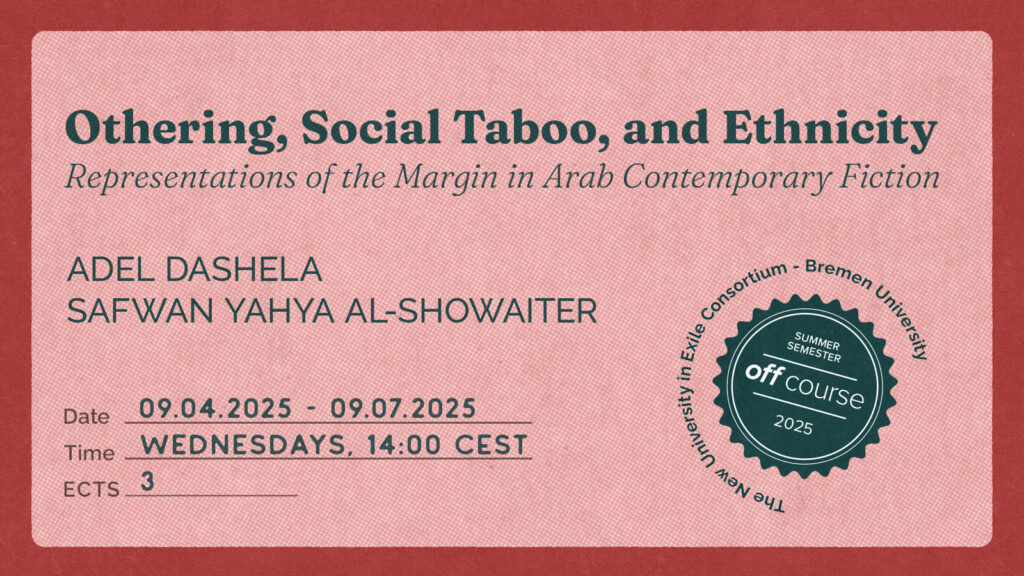Othering, Social Taboo, and Ethnicity
Representations of the Margin in Arab Contemporary Fiction
Overview
This course is a thematic navigation of othering, social taboos, and ethnicity in Arab contemporary fiction, focusing on how marginalized ethnic communities are represented within novels. Contemporary Arab writers often engage with social norms, religious constraints, and political landscapes, exposing the tensions that shape identities on the periphery. We will use an interdisciplinary approach to analyse the chosen texts.Through multiple fields like anthropology, sociology, history, psychology, and cultural studies, We will thus examine these themes from various perspectives and gain a more comprehensive understanding of them. We will explore how marginalized individuals – particularly those who are different – are positioned in contrast to dominant social groups. The “othering” of ethnicities highlights the creation and regulation of social boundaries, emphasizing the role of taboos in reinforcing exclusion.
By comparing and contrasting the human condition across diverse cultural contexts, we can acquire knowledge of experiences, challenge stereotypes, and identify ingrained attitudes, considering the thin line between the universal truth and specific contexts. The course also investigates how these narratives reflect broader struggles with diversity, difference, and power, offering nuanced critiques of Arab societies. Moreover, it sheds light on how literature becomes a site for negotiating identity, challenging hegemonic norms, and providing insight into how social realities could be constructed.
Learning Outcomes
By the end of this seminar, the participants will be able to:
- Familiarize with related key concepts such as ethnicity, race, nationalism, othering processes, social taboo, and the intersections amid all of them.
- Analyze Literary Representations of Marginalization:
- Identify and critically analyze the portrayal of marginalized ethnic groups in contemporary Arab fiction.
- Understand the role of language and narrative in shaping perceptions of the “other.”
- Examine the Impact of Social Taboos:
- Investigate the influence of cultural and religious taboos on the lives of marginalized individuals.
- Analyze how taboos maintain social hierarchies and marginalize specific groups.
- Understand the Interplay of Ethnicity and Identity:
- Examine the complex relationship between ethnicity, nationality, and individual identity.
- Analyze the impact of historical and political factors on the formation of ethnic identities.
- Explore how marginalized ethnic groups resist dominant narratives and assert their own cultural heritage.
- Apply Interdisciplinary Perspectives:
- Utilize concepts from anthropology, sociology, history, psychology, and cultural studies to analyze the literary texts.
- Develop a nuanced understanding of the social, cultural, and political contexts that shape the experiences of marginalized individuals.
- Apply critical thinking skills to evaluate the representations of marginalized groups in contemporary Arab fiction.
Course Outline
Week 1: Warming up and familiarizing with basic notions about the course
The first lecture is an orientation with basic notions that will be useful throughout the course. It will be interactive to warm -up students for the upcoming lectures. The lecture will focus on the most important points and themes, allowing for a better understanding of the processes the course will examine in detail later when talking about ethnicity and othering in Arab contemporary fiction. The lecture is participatory in nature and thus aims to address the emerging issues surrounding the subject matter of this course as comprehensively as possible.
Week 2: Introduction to Othering, Social, Political Taboos, The Unspoken Taboos, Ethnicity: Representations of the Margin in Arab Contemporary Fiction.
The second lecture will be an introduction to the course title. In general, concepts of ethnicity, race, nationalism, and collective identity are crucial to go further in this course. It will also contain an elaboration on the related key terms of the course, such as othering, taboos, or marginalized identities in the Arab world. Moreover, a brief introduction will be about the historical and socio-political context of the Arab world, highlighting key factors that contribute to the formation and perpetuation of othering and taboos.
Week 3: Social Exclusion in Ali Al-Muqri’s Black Taste, Black Odour (2008).
This lecture introduces the writer, the socio-cultural background of the Yemeni society, and the ethnicity in Yemen in which Akhdam (Afro-Yemeni people) represent the outcast marginalized group. It delves into the poignant exploration of social exclusion in Ali Al-Muqri’s novel Black Taste, Black Odour (2008). It also examines how Al-Muqri portrays the multifaceted experiences of marginalization and discrimination faced by characters within the novel’s socio-political landscape.
Week 4: Ethnic Cleansing, Stigmatization, and Self Struggle in Singar’s Virgin (2023) by Ward Badr Al-Salim
This lecture introduces the Yazidis, a mainly Kurdish-speaking religious minority in northern Iraq. It also highlights the tragedy of the Yazidis in Iraq. In August 2014, an estimated 600 Yazidi men and boys were killed, while all the women and girls were taken into slavery. After taking their areas in northwestern Iraq, ISIS made a concerted effort to exterminate the local Yazidi population, killing men and boys. They also kidnapped thousands of women and girls, about 3,000 of whom remain missing. More than 5,000 men were killed; around seventy mass graves have been found until today. More than 7,000 Yazidi girls and women were enslaved… (Kothe 212).
Week 5: Nubian Question in Idris Ali’s Dongola: A Novel of Nubia. (Translated by Peter Theroux, February 1999).
After introducing Nubia, this lecture delves into the complex “Nubian Question” as explored in Idris Ali’s novel, Dongola: A Novel of Nubia. The lecture also examines how Ali, through the lens of fiction, grapples with the historical and contemporary challenges faced by the Nubian people.
Week 6: Breaking Taboos: Identity and Belonging in The Druze of Belgrade (2012) by Rabee Jaber.
This lecture will explore the complex themes of identity and belonging in the experiences of the Arab Druze community in Serbia, as represented in The Druze of Belgrade. The novel explores the historical and political factors that have shaped the Druze diaspora, including the Ottoman Empire, the Balkan Wars, and the Yugoslav conflicts.
Week 7: Layla Qasrani’s The Blind Birds and Armenian Genocide
Armenian ethnicity settled in different Arab countries to escape the genocide executed on them by the Ottomans. The lecture discusses The Blind Birds (2016) by Layla Qasrani, a historical fiction about the Armenian genocide. It explores themes of memory, silence, and the search for identity. It examines the profound and lasting impact of the collective trauma on subsequent generations of Armenian families. The lecture demonstrates the importance of literature as a tool for historical memory. It highlights the Intergenerational Trauma and Identity. It also focuses on the preservation of Identity within Integration.
Week 8: Attila: The Last Lover (2019): Imagined History and the Kurdish Agony
This lecture explores Attila: The Last Lover (2019) by the Kurdish writer Serdar Abdullah, examining how it employs “the imagined history” to describe the complex Kurdish experience. This lecture shows how the novel narrates the history of the Kurdish revolution, addresses social, sectarian, and national conflicts, and culminates in the martyrdom of an Arab fighter in the ranks of the Kurdish revolution. It offers a comprehensive narrative that spans generations and explores the multifaceted challenges faced by the Kurdish people.
Week 9: The Making of Tuareg Canon: Ibrahim Al-Koni and Fiction of the Desert
Tuareg people mainly inhabit the desert of North Africa. In Ibrahim Al-Koni’s novels, we can find a whole fictional world of Tuareg culture. In his fiction, Al-Koni transcends traditional portrayals of the desert as a barren wasteland, depicting it as a vibrant and dynamic space filled with life, history, and spiritual significance. This lecture describes how Al-Koni’s fiction challenges Western stereotypes about the desert and its inhabitants, offering a deep and insightful perspective on life in the Sahara.
Week 10: Circassian People and the Arab Landscape in The Exodus from Sosruqa (1993): A Novel of Circassian Diaspora by Zahra Omar
This lecture explores the intricate relationship between the Circassian people and the Arab landscape as depicted in Zahra Omar’s The Exodus from Sosruqa (1993). The lecture examines how the novel portrays the Circassian Experience in the Arab World. The novel probes into the historical and contemporary experiences of the Circassian diaspora in the Arab world, exploring their displacement, integration, and cultural adaptation.
Week 11: Cosmopolitan City and Ethnic Identity in Arab Fiction
In fiction, cosmopolitan cities and ethnicity often intertwine to create rich narratives that explore themes of identity, belonging, and cultural exchange. Cosmopolitan cities are often depicted as “melting pots” where people from diverse ethnic backgrounds blend their cultures to create a unique, hybrid identity. Cosmopolitan cities can also be sites of tension and conflict between different ethnic groups.
Week 12: Hybrid Culture: The Greek Experience in Egypt
In a riveting tale spanning over a century, Ghada Al-Absi delves into the chronicles of the Kozzika distillery, once a prominent fixture in Egypt’s Tura district. The narrative unfolds through the lens of the Kozzika family, Greek immigrants who found themselves ensnared in the tumultuous tapestry of Egypt’s past. This family saga narrates the story of Theokhari Kozzika as he journeys from Greece to Alexandria, bearing witness to the city’s infamous massacre and the ensuing British occupation.
Week 13: Is it Class or Ethnicity Consciousness? Social Struggle and Ethnic Marginalization in The Jungo: Stakes of the Earth
The Jungo: Stakes of the Earth (2009) by the Sudanese novelist Abdelaziz Baraka Sakin, is the masterpiece of contemporary Sudanese literature. The Jungo, a marginalized and forgotten segment of seasonal agricultural workers in the Sudanese-Ethiopian-Eritrean border region, represents a specific ethnic and social class. Their lives are marked by hardship, reflecting the realities of their interactions with the diverse mix of local populations in this exceptional place, which is highly distinctive in terms of its people, society, culture, and language. Despite their significant contribution to the production of Sudanese wealth, they remain largely invisible to the central government, facing exploitation and neglect.
Week 14: Ethnicity and Dual Identity in The Bamboo Stalk
The Bamboo Stalk (2013) by Kuwaiti author Saud Alsanousi explores the complex issues of ethnicity through the story of Jose, a young man born to a Filipina mother and a Kuwaiti father. Jose struggles with his dual identity throughout the novel. He was raised in the Philippines but yearns to connect with his father’s homeland, Kuwait. However, upon arriving in Kuwait, he faces discrimination due to his Filipino heritage. The novel explores the social hierarchy of Kuwait, where ethnicity plays a significant role. The story confronts the challenges faced by foreign workers in Arab countries and the deeply rooted prejudices around ethnicity.
Instructors
Adel Dashela
Adel Dashela is a Yemeni researcher and lecturer, currently a postdoctoral fellow at Columbia Global Centers-Amman, Columbia University. He holds an MA in English Literature from The English and Foreign Languages University, Hyderabad, India, in 2012, and a PhD in English with a focus on political prison literature in the Arab World from DR. BAMU, India, in 2018. He has significant experience participating in international academic conferences across India, Türkiye, Finland, Jordan, and the Netherlands. He has authored and co-authored three books in Arabic and contributed numerous research papers and analytical articles in both Arabic and English.
Safwan Yahya Al-Showaiter
Safwan Yahya Al-Showaiter is a Yemeni Associate Professor of English Literature. He obtained his M.A in 2012 and Ph.D in 2023 from The English and Foreign Languages University, Hyderabad, India. He has worked at Taiz University, Yemen (2020), and Rashtriya Raksha University, India (2024). His areas of interest are Postmodern discourse, autobiography theory, cultural studies, and folk studies. Besides, he translated The Digital Multinational: Navigating the New Normal in Global Business, and co-translated Drawing on the Right Side of the Brain” into Arabic, both books published by Raaf Publishing, Saudia Arabia (2022).
Certification
This course is hosted by Bremen University and certified with 3 ECTS upon successful completion.
Please check the course requirements from the course syllabus and inform your instructor(s) about your request to receive a certificate for this course.
You will find the full syllabus on Moodle course page.
At the end of the semester, the instructors will inform the learning designer about your request and grade. The certificate will be prepared with the university secretariat and it may take up to 8 weeks.
Registration
Our courses are held on a digital learning platform, Moodle. Before you create your account on Moodle, we have some notes for your and others’ digital security.
- When you register, you can use a nickname. Nicknames with offensive, racist or sexist undertones will not be accepted.
- Communication outside of the platform is not private. It is a solidarity action with people who would like to stay anonymous for different reasons. Please use our secure platform to communicate with others and respect their choices of communication channels.
- We aim to create an inclusive learning environment with our participants and educate ourselves in a more inclusive language. Be eager and tolerant to learn from each other and challenge any discriminating language. You can have a look at it here.
Creating a new account and registering to a course on Moodle
1. The link will take you to the Off University Moodle homepage.
2. Click the “Log in” button on the top right side of the page.
If you have an account on Off University Moodle, please login and continue from step 7 below.
3. Scroll down to see “Create new account” and click the button.
4. Please fill in the fields marked as *required.
You can use false information to protect your identity and increase your safety. You can enter a nickname, a false email address that resembles the format, such as name@example.org etc. Please note down your user name and password in a safe place.
5. Once you created your account, please wait until the next working day to continue.
Your account needs activation which will be done by Off University. We will need some time to activate your account. This can take up to 24 hours on weekdays and longer on weekends.
6. Please login to check whether your account it active. Once you can login, you will find the available courses on the home page of Moodle and will be able to register by clicking the course title.
7. You can now discover the course page. The first item on the page, General, contains the syllabus and the announcements. Please follow these announcements to stay up to date about your course.

Course Details
Duration
09.04.2025 -09.07.2025
Time
Wednesdays, 14:00 CEST
Credits
3 ECTS
Language
English
Host Institution
Bremen University, Institute of Anthropology and Cultural Research
Registration:
Supported by:



